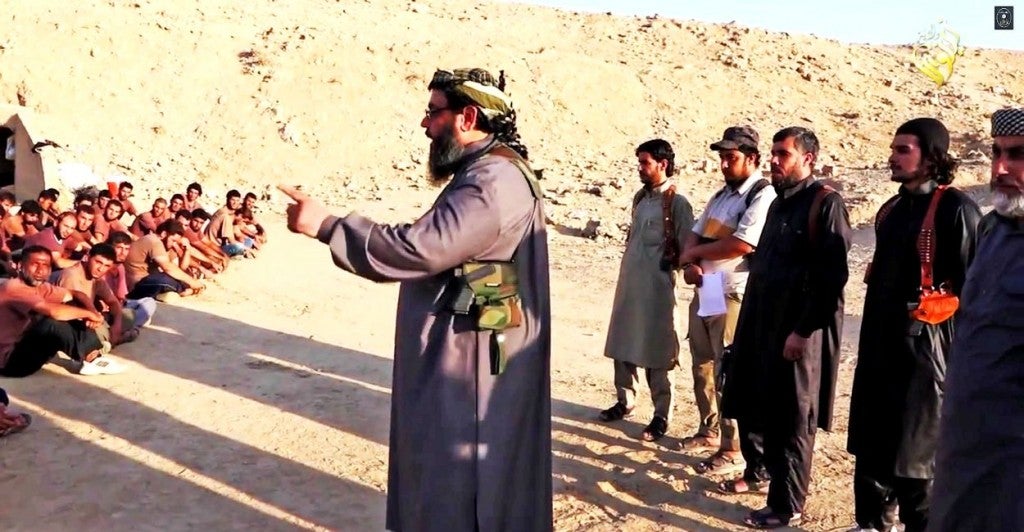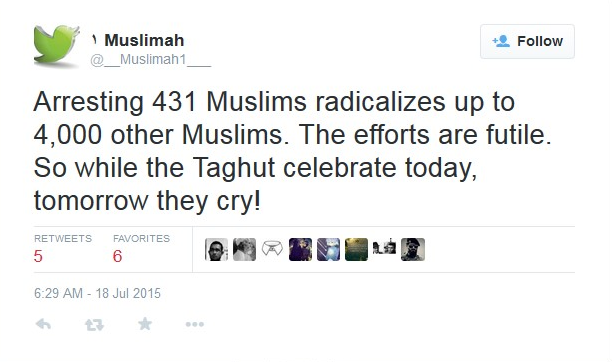With every new terrorist attack, the inevitable question we all end up asking is “why didn’t anyone see it coming?”
Even with the increased experience of terrorism around the globe, there is still no clear answer for how and why someone becomes motivated to commit these heinous crimes.
In recent congressional testimony, FBI Director James Comey stated that his agency was overwhelmed, dealing with terrorists who have “gone dark” through encrypted communication on the Internet and appealing for greater help from local law enforcement authorities to ferret out potential attackers.
Many communications, however, remain accessible and can provide important clues through the use of key words used by potential terrorists—especially those on Twitter.
For instance:
Alberto Fernandez, who is the vice president of the Middle East Media Research Institute, argues in a new report, “Islamic Words that Kill,” that tweets such as this contain phrases that should raise red flags for authorities charged with tracking radicalization.
“Jihadspeak,” as Fernandez writes, is not very different in nature from the jargon that establishes gang membership of other kinds.
Its religious foundation, though, makes it far more potent and gives it wider appeal.
Its code words should be well understood by those who track actual and potential terrorists.
Here are a few examples:
Taghut – Jihadist shorthand for “the other,” for idolatry and unbelief. Taghut is the spirit of idolatrous tyranny that must be fought and completely eradicated. Anti-jihadist regimes in the Muslim world who should be overthrown are also considered taghut.
Jihad Fisabilillah – Since the late 1970s, the idea has been promoted that jihad is an individual responsibility incumbent on every Muslim.
Khilafa and Jizya – “Blood money” extracted from Christians, or even other Muslims, as a third option rather than converting or being killed. This has been revived by ISIS as being essential to their regime.
Mushrikeen – Used against Christians, who believe in the Holy Trinity, something that the Koran clearly rejects.
Rafidah – An early term used against Shia Muslims, now gaining new currency as a derogatory word used by Sunni Muslims.
Kufar – Infidels. When used against a non-Muslim, this means open season on that individual or group of people.
In his analysis of terror tweets and communication, Fernandez brings lots of experience countering Islamic terrorists’ propaganda.
In his previous job, Fernandez headed the Center for Strategic Counterterrorism Communication at the State Department. This is the office charged with fighting the ideological and informational war against terrorist groups like ISIS.
He finds, not surprisingly, that being a sympathizer of a terrorist group can be a first step towards violence.
Even though the individuals behind these tweets may not all end up like the Chattanooga shooter, Muhammad Abdulazeez, they have nonetheless been bought into a lethal narrative promoted by terrorists.
Social media provides an unparalleled tool for long-distance brainwashing and encouragement to violence. Through the vision of an idealized “Caliphate” promoted by ISIS propagandists, those at risks are able to be swayed.


